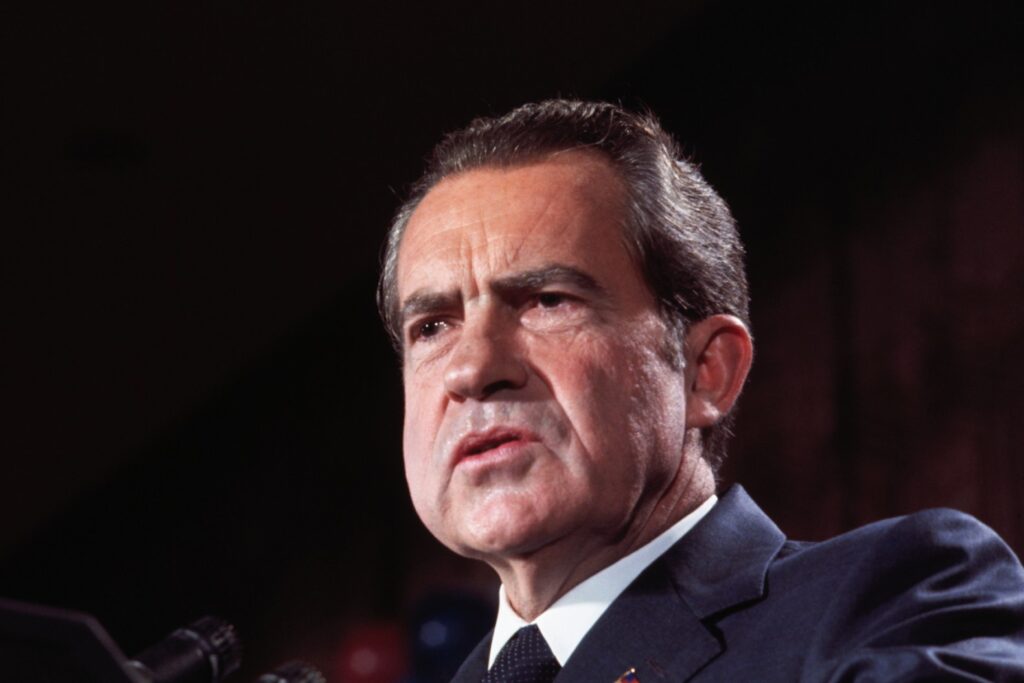Former President Richard Nixon, who launched the war on drugs in 1971 that has had repercussions to this day, admitted he knew marijuana was “not particularly dangerous.”
His admission during a meeting with a group of aides at the White House was recorded in March 1973, via his secret recording system. It was only recently made available after a lobbyist for the cannabis industry came across the conversation amid listening through hours of tapes, as The New York Times reports.
“Let me say, I know nothing about marijuana,” he said. “I know that it’s not particularly dangerous, in other words, and most of the kids are for legalizing it. But on the other hand, it’s the wrong signal at this time.”
Though he publicly argued that drug abuse was “public enemy number one,” he privately questioned during the meeting the extreme punishments Americans were subjected to for marijuana crimes. “Penalties should be commensurate with the crime,” Nixon said during that Oval Office conversation, noting a 30-year sentence in a cannabis case he recently learned about and added, “The penalties are ridiculous.”
“I have no problem that there should be an evaluation of penalties on it, and there should not be penalties that, you know, like in Texas that people get 10 years for marijuana. That’s wrong,” Nixon said.
Despite Nixon’s reticence over the harsh criminalization for marijuana, he instituted the federal government’s drug classification system, and he designated marijuana among the substances believed to be most abused and deemed as having no proven medical value. Since then, its categorization has led to mass incarceration, disproportionately affecting Black people who are 3.6 times more likely to be arrested for marijuana possession, per analysis conducted by American Civil Liberties Union. Nixon’s decision also hampered progress on research over the therapeutic potential of marijuana through the last five decades.
Nixon’s newly discovered remarks come as the federal government is reconsidering marijuana’s placement as a restricted Schedule 1 drug, which includes heroin and LSD. In May, the Department of Justice said that the attorney general was circulating a “proposal to reclassify marijuana from Schedule I to Schedule III.” The Drug Enforcement Agency has scheduled a public hearing for after the presidential election, on Dec. 2, to consider various viewpoints on the proposal.
Meanwhile, both primary presidential candidates have appeared to advocate for loosening marijuana policies. In an interview with Rolling Stone published in June, prior to Kamala Harris becoming the Democratic presidential nominee, the vice president discussed her comments that marijuana should not be a Schedule 1 drug. “I stepped on a couple of toes when I made the public statement, ‘Can we move on with this? Do the analysis on the [drug] schedule. Move it. Change it.’”
Though Donald Trump appointed a slew of anti-pot crusaders to his cabinet, last month he acknowledged that a ballot measure that would legalize recreational marijuana in Florida appeared inevitable. Without quite endorsing it, he suggested he supported the decriminalization of marijuana. “Someone should not be a criminal in Florida, when this is legal in so many other States,” he wrote on his social media platform Truth Social, via The Times. “We do not need to ruin lives & waste Taxpayer Dollars arresting adults with personal amounts of it on them, and no one should grieve a loved one because they died from fentanyl laced marijuana.”
H/T: www.rollingstone.com



